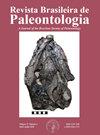Turonian microfossil assemblage of the Eagle Ford Formation from the La Bolita locality, Coahuila, Northwest Mexico
IF 0.6
4区 地球科学
Q4 PALEONTOLOGY
引用次数: 2
Abstract
Late Cretaceous carbonate rocks of the Eagle Ford Formation are widely distributed in north-western Mexico (Nuevo Leon, Coahuila, Chihuahua) and southern USA (Texas). Around the La Bolita locality, Castanos town (Coahuila State), this unit consists of approximately 31 m of marine deposits, characterized by thin-bedded, slightly clayey limestones. Within the scope of a microfacial analysis, 20 hand samples were collected from selected limestone levels. Identified microfossil remains are mostly represented by planktonic foraminifers, among which: Planoheterohelix moremani, P. reussi, P. globulosa, Globigerinelloides bollii, Globigerinelloides spp., Muricohedbergella delrioensis, M. planispira, Muricohedbergella spp., Whiteinella archaeocretacea, W. aprica, W. baltica, W. brittonensis, W. inornata, W. paradubia, Whiteinella spp., Clavihedbergella moremani, C. simplex, Marginotruncana renzi, M. sigali, M. schneegansi, M. pseudolinneiana, Marginotruncana spp., Praeglobotruncana algeriana, and Dicarinella canaliculata. There are also abundant calcispheres, such as Risserella rablingae, Pithonella ovalis, and Calcisphaerula innominata; as well as roveacrinoid ossicles (genus Roveacrinus), and unidentified radiolarians. Based on the stratigraphic range of both the genus Marginotruncana and the species Praeglobotruncana algeriana, an early–middle Turonian age is assigned to the studied section. The pelagic microfossil assemblage and the lithological features all suggest deposition of the studied sediments in an open marine platform, with poorly oxygenated, nutrient-rich waters.墨西哥西北部科阿韦拉La Bolita地区Eagle Ford组的土仑微化石组合
晚白垩世Eagle Ford组碳酸盐岩广泛分布于墨西哥西北部(Nuevo Leon、Coahuila、Chihuahua)和美国南部(Texas)。在Castanos镇(Coahuila州)的La Bolita地区周围,该单元由约31米的海相沉积物组成,其特征是薄层状,微粘稠的石灰石。在显微面部分析的范围内,从选定的石灰石层收集了20个手部样本。已鉴定的微化石遗迹多以浮游有孔虫为代表,其中:莫氏平螺旋体、雷氏平螺旋体、球形平螺旋体、bolliglobigerinelloides spp、delriomurohedbergella、planispira、Muricohedbergella spp、archaeo白垩纪白氏白氏菌、aprica白氏菌、baltica白氏菌、brittonensis、inornata白氏菌、parubia白氏菌、Clavihedbergella moremani、C. simplex、marinotruncana renzi、M. sigali、M. schneegansi、M. pseudolinneiana、marinotruncana spp、阿尔及利亚平氏平氏白氏菌和Dicarinella canaliculata。也有丰富的钙化菌,如rablingae Risserella, Pithonella ovalis和Calcisphaerula innominata;以及轮虫类小骨虫(轮虫属)和未识别的放射虫。根据marinotruncana属和Praeglobotruncana algeriana种的地层范围,将研究剖面确定为早-中Turonian时代。远洋微化石组合和岩性特征都表明,所研究的沉积物沉积在一个开放的海洋平台,缺氧,富营养的水域。
本文章由计算机程序翻译,如有差异,请以英文原文为准。
求助全文
约1分钟内获得全文
求助全文
来源期刊

Revista Brasileira De Paleontologia
PALEONTOLOGY-
CiteScore
1.60
自引率
14.30%
发文量
25
审稿时长
>12 weeks
期刊介绍:
It publishes original contributions on all aspects of Paleontology. Papers are written in English, Spanish, or Portuguese and are reviewed by international experts.
 求助内容:
求助内容: 应助结果提醒方式:
应助结果提醒方式:


